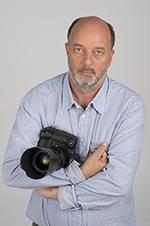
Our craftspeople: unseen Savoir Faire! Guy Delforge May 2017
For some years now, I have been infatuated with beautiful and rare creations. That's because our regions are overflowing with unseen talent, which often has a worldwide reputation. They are there, discreetly set up in their workshops: our craftspeople creating artistic wonders which will dazzle connoisseurs. My aim is to document them all. This fundamentally photographic work gave rise to a website entirely devoted to exceptional handcrafted work.
My last article presented Guy Delforge, a Master Perfumer by trade, who works in the prestigious setting of the fortress at Namur. Find the full article and the extra images at my site www.lesmiroirsdelombre.com
Patrice Niset - May 2017.
"The Perfumes have slowly matured in the Cellars of the Château des Comtes de Namur, a stone's throw from Brussels and Paris, the Capital of Perfume.
Like a well-kept secret, Perfumes are, in turn, inviolable, consenting, tempting or reserved...An invitation to discover or a simple desire to please... Here are your Perfumes... It's up to you to tame them!"
Guy Delforge
The location is quite simply magical! Proudly overlooking Namur, the atelier of the perfumer Guy Delforge is an exercise in superlatives. At a time when no industrial perfumer will ever let you visit their ateliers (the difference is so striking between the blandness of the facilities and the glamorous image built up via millions of advertising euros), Guy Delforge plays the opposite card: that of transparency. That's because this former munitions storehouse from the 15th century lends itself perfectly to the occasion. Like Maison Graffé, which benefits from the undeniable preservation qualities of bunkers for its wines, Guy Delforge ages his perfumes for months, sheltered from the hustle and bustle of the nearby city. Offering serenity and sensuality at the gates to the city, welcome to an extraordinary world.
Guy Delforge: At the start of the 1990s, I was fortunate to visit a couple who were passionate about essential oils, and who were thinking about quitting the profession they exercised in addition to being teachers. This friendly visit transformed into a veritable love affair, because for the next two days, the fragrances of the oils followed me around, despite the fact that I didn't bring anything tangible back home, contact with the oils was enough to intoxicate me for the rest of my life. I consequently decided to take over the activity out of curiosity, slightly "intoxicated" already, but without having a clear idea where it would lead me, given that I already had a very stable profession in finance. Like De Funes in the film La Zizanie, my secondary activity took up such a space in my life that it was time to make important decisions. When I transformed my swimming pool into a laboratory, my wife pleaded with me to look for a more suitable location for my activity.
LMdO: And so you decided to rent a munitions storehouse which had been abandoned for 10 years, and which needed a complete renovation.
GD: I like to think that this place of war and conflict now serves as a setting for subtle and delicate aromas. My obsession is to bring people together. Built by the French and completed by the Dutch, the fortress symbolises conflict to such an extent that the idea of seeing foreign visitors here surrounded by the subtleties of the fragrances gives me a lot of satisfaction. My visitors are ordinary people, but I have had major global figures showing an interest in my perfumes, as evidenced by my guestbook. It is therefore a place of coming together and cohesion. The perfume atelier helps safeguard the heritage, as I discovered galleries when carrying out work. For example, the organ and estagnon room was completely buried when I got here. The fortress is still concealing a lot of hidden treasure. Graffé Lecocq mature their wines here, and I do the same with my perfumes, but there is still a lot which can be harnessed. We're not on this wonderful route for nothing.
LMdO: You are the only artisan perfumer in the Kingdom, and even Europe. What is your unique feature in comparison with the major brands?
GD: In effect, I don't know anyone who is able to offer as many perfumes as I do in such a prestigious setting. I have an artisanal working method. You will never find industrial alcohol derived from petroleum in my bottles. I only work with beet alcohol and my perfumes mature for 13 months before being sold, I let time do its work, which is something the industry no longer does. The molecules need to mature, just like for a wine.
LMdO: How did you learn your craft?
GD: It was my obstinacy which enabled me to approach independent perfumers in France who were used to working with the major brands, which is no longer the case today. These 'noses' as they are called, performed commissioned work according to specifications. I was already older than 45 and my unusual career path interested them. Personal tests did the rest. With my 500 basic estagnons, the combinations are endless, even if my essential oils organ is smaller than that of an industrial producer. Nonetheless, I currently have 30 compositions on sale, and another series in development.
LMdO: What is a good perfume?
GD: It is firstly a question of taste. In that sense, there is no such thing as a bad perfume, it is the customers which make it a success or not. It's especially in its robustness where nuances can be made. The combination of essential oils and alcohol generates a whole chain of chemical reactions: the trick is to stabilise them over time, to avoid unfortunate turns which denature the product. And for that, there is only one solution: time! As such, every new fragrance is tested for months to ensure that it holds together. The rhythm of the seasons is also important, as is the skin type. A perfume needs to remain stable in all circumstances.
LMdO: Perfumes are a dream, slogans, designer packaging, a lot of marketing, and often millions of euros swallowed up in advertising campaigns. How do you position yourself in all that, as a small production unit?
GD: Right from the start, I knew I would never be able to compete in the territory of the major groups. They have colossal resources. I differentiated myself by offering a high-quality artisan product, made the old-fashioned way in a prestigious setting. My packaging is different for each of my perfumes, and advertising is non-existent as such. The value for money I provide does the rest. My eaux de parfums have nothing to envy the major groups, I make them more concentrated and apply lower prices. In the end, I am up to 4 times cheaper than the competition. Moreover, the internet has completely revolutionised my method of selling, since I can dispense with mass distribution and deal directly with my customers.






